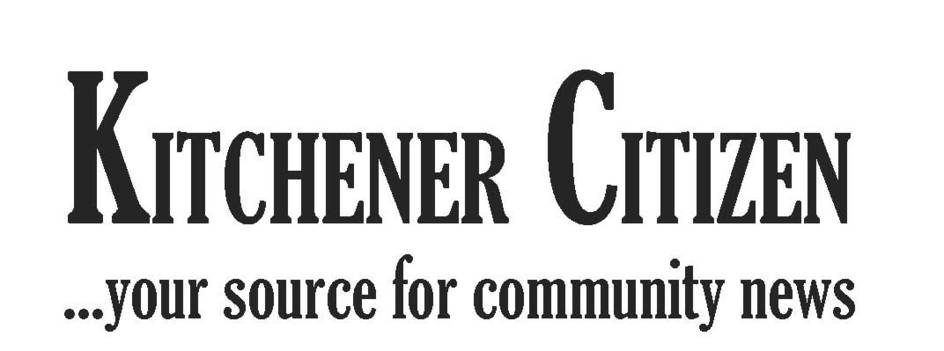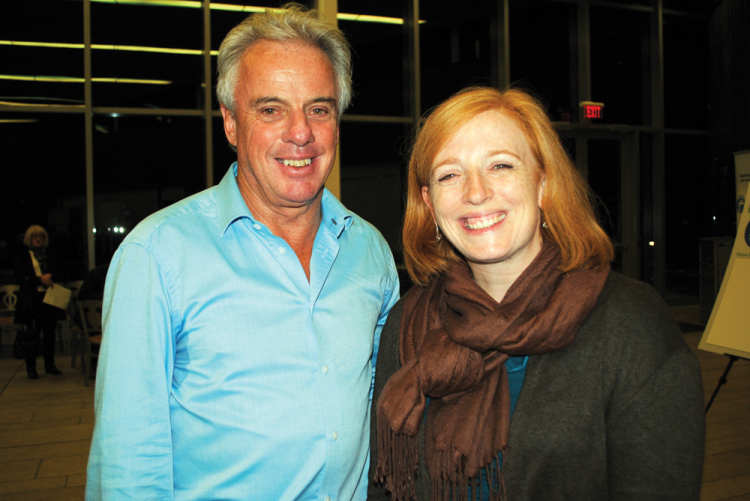

QUIRKS & QUARKS HOST BOB MCDONALD
Region of Waterloo starts biosolids discussion
with an entertaining examination of human waste
Region of Waterloo starts biosolids discussion
with an entertaining examination of human waste
by Helen Hall
Kitchener Citizen
December 3, 2015
The Region of Waterloo wants you to start thinking about your ‘poop’, and in particular, where it goes after it leaves your house.
To start the conversation, the Region invited Bob McDonald to the Waterloo Region Museum in Kitchener on November 17 to talk about the planet earth, its water, and the effect of wastewater on both.
The region is beginning a four year biosolids strategy study. Biosolids are the solids that remain after the water has been drained from wastewater that comes from homes. The region currently has 13 treatment plants that treat the wastewater and, after treatment, the remaining biosolids are disposed of in landfills or distributed to farms for fertilizers. The biosolids strategy will determine how the region will deal with biosolids in the future.
McDonald is a science reporter and the host of the show Quirks & Quarks on CBC radio. He is the author of four best-selling science books, and has eight honorary doctorates from Canadian universities.
“Water is as old as the earth itself,” McDonald told a crowd at the Waterloo Region Museum. Water is not created, but is recycled through the environment when rain and snow melt, evaporate, then turn into rain and snow again.
Therefore, he said with a smile, “when you drink a glass of water, it has probably been through a dinosaur, and possibly through someone you know.”
Because of this, he stressed the importance of protecting the earth’s water. “It’s miracle, miracle stuff.”
McDonald gave a brief history on how mankind has dealt with disposing of human waste, in his cheekily entitled presentation “10,000 Years of Poop.”
McDonald said that human waste was not a problem when humans were hunters and gatherers. It didn’t accumulate in one place because humans moved around.
Ten thousand years ago, during the neolithic era, humans created tools to be used for agriculture and began farming, so they no longer needed to travel to find food. Farms fed more than one family, and people started staying in one spot - and so did their waste. Today, some cities have over a million people, “creating a lot of poop.”
McDonald said drawings from 1700 BC show that the Romans built commodes that emptied into sewers that drained into rivers, lakes and seas.
“Once it was out of sight, it was out of mind,” McDonald said.
However, people drank from those rivers, too. Soon, there were many deaths from sickness and plagues, that we now know were caused by the human waste in the water.
McDonald said that once humans started having better sanitation and treating our waste, our life expectancy increased. However, there are still many parts of the world without proper water treatment.
McDonald said that even today in Canada, not all communities treat their waste. His home of Victoria, British Columbia is just building its first wastewater treatment plant.
“They’ve always just flushed it out to sea,” he said.
In 2000, seven people died and 2,300 became ill in Walkerton, when its groundwater supply was contaminated with e. coli bacteria from farm runoff that contained animal waste. Staff did not properly test and treat the water before it entered the town’s water supply.
Although a photograph of the earth looks like there is a lot of water to share, McDonald said very little is drinkable. He said 90 percent of the world’s water is salty. Of the remaining 10 percent, 90 percent is frozen, and much of the remainder is too far underground or located in the stems and leaves of plants.
“About .003 percent of all the water in the world is drinkable for seven billion people,” McDonald said. “And that’s what we are pooping in.”
Canada is fortunate to be the home of 20 percent of the world’s drinkable water, because of the great number of rivers and lakes in the country.
“We have a responsibility to take care of it,” McDonald said.
McDonald talked about humanity’s search for other livable planets in the universe. So far, none have been found that can sustain human life.
“All the planets we know of will kill you,” he said. “The universe is a violent and deadly place, and this little oasis we live on is all we have.”
McDonald didn’t offer any answers as to how the region should handle its biosolids or wastewater in the future, but said he just wanted to start a discussion. “I’m a proponent of public education.”
“Let’s be smart. We went to the moon. We talk to people on the other side of the world from a device that can fit in our pockets,” he said. “We have to stop giving our garbage to the future.”
Kitchener Citizen
December 3, 2015
The Region of Waterloo wants you to start thinking about your ‘poop’, and in particular, where it goes after it leaves your house.
To start the conversation, the Region invited Bob McDonald to the Waterloo Region Museum in Kitchener on November 17 to talk about the planet earth, its water, and the effect of wastewater on both.
The region is beginning a four year biosolids strategy study. Biosolids are the solids that remain after the water has been drained from wastewater that comes from homes. The region currently has 13 treatment plants that treat the wastewater and, after treatment, the remaining biosolids are disposed of in landfills or distributed to farms for fertilizers. The biosolids strategy will determine how the region will deal with biosolids in the future.
McDonald is a science reporter and the host of the show Quirks & Quarks on CBC radio. He is the author of four best-selling science books, and has eight honorary doctorates from Canadian universities.
“Water is as old as the earth itself,” McDonald told a crowd at the Waterloo Region Museum. Water is not created, but is recycled through the environment when rain and snow melt, evaporate, then turn into rain and snow again.
Therefore, he said with a smile, “when you drink a glass of water, it has probably been through a dinosaur, and possibly through someone you know.”
Because of this, he stressed the importance of protecting the earth’s water. “It’s miracle, miracle stuff.”
McDonald gave a brief history on how mankind has dealt with disposing of human waste, in his cheekily entitled presentation “10,000 Years of Poop.”
McDonald said that human waste was not a problem when humans were hunters and gatherers. It didn’t accumulate in one place because humans moved around.
Ten thousand years ago, during the neolithic era, humans created tools to be used for agriculture and began farming, so they no longer needed to travel to find food. Farms fed more than one family, and people started staying in one spot - and so did their waste. Today, some cities have over a million people, “creating a lot of poop.”
McDonald said drawings from 1700 BC show that the Romans built commodes that emptied into sewers that drained into rivers, lakes and seas.
“Once it was out of sight, it was out of mind,” McDonald said.
However, people drank from those rivers, too. Soon, there were many deaths from sickness and plagues, that we now know were caused by the human waste in the water.
McDonald said that once humans started having better sanitation and treating our waste, our life expectancy increased. However, there are still many parts of the world without proper water treatment.
McDonald said that even today in Canada, not all communities treat their waste. His home of Victoria, British Columbia is just building its first wastewater treatment plant.
“They’ve always just flushed it out to sea,” he said.
In 2000, seven people died and 2,300 became ill in Walkerton, when its groundwater supply was contaminated with e. coli bacteria from farm runoff that contained animal waste. Staff did not properly test and treat the water before it entered the town’s water supply.
Although a photograph of the earth looks like there is a lot of water to share, McDonald said very little is drinkable. He said 90 percent of the world’s water is salty. Of the remaining 10 percent, 90 percent is frozen, and much of the remainder is too far underground or located in the stems and leaves of plants.
“About .003 percent of all the water in the world is drinkable for seven billion people,” McDonald said. “And that’s what we are pooping in.”
Canada is fortunate to be the home of 20 percent of the world’s drinkable water, because of the great number of rivers and lakes in the country.
“We have a responsibility to take care of it,” McDonald said.
McDonald talked about humanity’s search for other livable planets in the universe. So far, none have been found that can sustain human life.
“All the planets we know of will kill you,” he said. “The universe is a violent and deadly place, and this little oasis we live on is all we have.”
McDonald didn’t offer any answers as to how the region should handle its biosolids or wastewater in the future, but said he just wanted to start a discussion. “I’m a proponent of public education.”
“Let’s be smart. We went to the moon. We talk to people on the other side of the world from a device that can fit in our pockets,” he said. “We have to stop giving our garbage to the future.”

Kitchener city councillor Sarah Marsh was on hand to hear CBC Radio’s Quirk & Quarks host Bob McDonald speak at the Waterloo Region Museum November 17.
For News Tips & Advertising call...
Kitchener East - 519-578-8228
Kitchener West - 519-394-0335